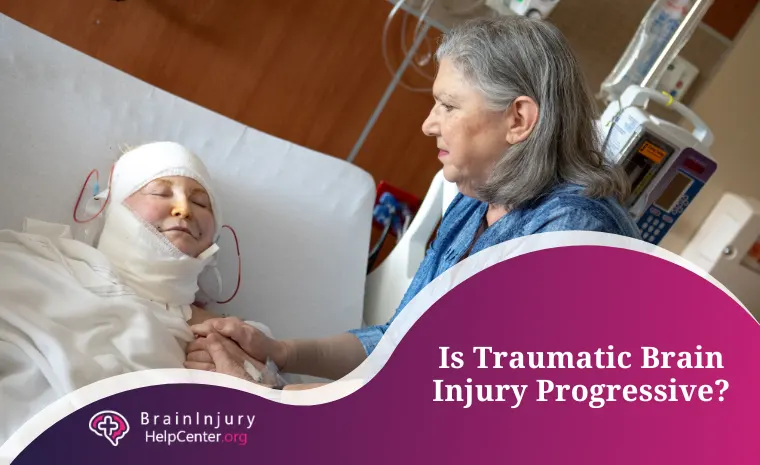Is traumatic brain injury progressive in nature, and what are the long-term effects associated with it? Victims of a traumatic brain injury may wonder whether or not their condition will get worse months after injury. Simply put, it is possible.
No one brain injury is alike, and some symptoms may improve over time, other effects may result in a long-term outcome and significantly affect a traumatic brain injury victim’s way of life.
Many things can be done to help people suffering from severe injuries, even if they have long-term effects. Even though there may be signs of decline, there are ways to prevent or reverse them.
In this article, we will talk about:
- Brain injury facts and terms
- Does a TBI get worse over time?
- Long-term effects of moderate-severe TBIs
- How to prevent a TBI from getting worse
Brain Injury Facts
A traumatic brain injury is the result of a violent jolt or bump to the head. Traumatic brain injuries, or TBIs, may be categorized as either closed or penetrating. These injuries are common in motor vehicle crashes, slip and fall accidents, violent assaults, and sports injuries.
According to the Mayo Clinic, mild TBIs may only temporarily affect brain cells. More severe head injuries may result in bruising, torn brain tissue, bleeding, and brain damage.

Primary and Secondary Brain Injury
A primary brain injury is sudden and severe damage to the brain that is considered to be mostly or completely finished at the time of impact. This occurs during a car accident, gunshot wound, or fall.
Primary injuries of an accident-caused TBI may include intracranial hemorrhage, cerebral edema, fractures, and diffuse axonal injuries (DAI). Axonal damage can cause comas and may result in injuries to different parts of the brain.
Secondary brain injury is the damage that occurs to the brain in the days or hours after injury. This head injury may consist of hypoxia, increased intracranial pressure, and infection.
Does the Brain Heal After Injury?
It has long been believed that the brain was incapable of healing itself after injury, being referred to as a “nonrenewable organ.” Yet, thanks to advances in neurobiology, research and additional clinical studies have come to find that the truth is in fact the opposite. The brain is capable of rewiring itself throughout time.
The brain is constantly changing and adapting based on experiences. This is because the neurons in the brain rely on connections to deliver messages that control every bodily function. Different pathways may form or become dormant based on these experiences.
Luckily, these connections can be rewired through the help of neuroplasticity.
Neuroplasticity
Neuroplasticity refers to the brain’s ability to adapt and change in response to the individual’s environment. This happens over time as new neural connections are formed.
Neuroplasticity is the brain’s ability to change and adapt in response to injury or traumatic events. This usually occurs through two processes: sprouting and rerouting.
Sprouting is when new connections form between neurons. Rerouting happens when damaged neurons are removed and a new pathway is created between active neurons.
This process of neural adaptation occurs through repetition and practice, as the brain strengthens connections between neurons in response to repeated stimuli.
This principle of neuroplasticity underlies many forms of therapy, such as physical therapy, speech therapy, and occupational therapy, which aim to optimize recovery by facilitating neural adaptation.
Is Traumatic Brain Injury Progressive Over Time?
Understanding the nature of traumatic brain injuries often raises the question: is traumatic brain injury progressive? Victims of a severe TBI may require rehabilitation to relearn basic skills to address cognitive impairment and physical, emotional, and behavioral changes.
The Brain Injury Association of America states that rehabilitation for individuals with TBI focuses on helping them regain the ability to perform everyday activities independently and safely. Once they have made progress in rehabilitation, they may transition to other forms of rehabilitation or return home.
Unfortunately, despite treatment strategies and rehabilitation services, the U.S. Centers for Disease Control and Prevention (CDC) reports that about 50% of people living with a traumatic brain injury will experience further decline in their daily lives.
The TBI Model Systems National Database shares that 30% of patients 16 years and older who receive inpatient rehabilitation services will experience long-term effects that worsen in the five years following their injury.
Research shows that a single TBI incident or repetitive injuries may result in secondary pathological conditions such as brain swelling, seizures, and sleep disorders, to name a few.
Risk factors for neurological diseases such as dementia are heightened in victims of TBI. Depression or depression-like behavior is also exceedingly common within the first year after injury.
Victims of traumatic brain injuries are also more likely to develop anxiety or exhibit anxiety-like behavior. In cases where a patient has suffered several blows to the head, chronic traumatic encephalopathy or CTE may occur.
These conditions worsen over time. Traumatic encephalopathy is commonly seen in athletes, military personnel, and survivors of domestic violence.
If you or a loved one have sustained a TBI, we can help you get the care you need. Do not hesitate to contact us to find out how we can help you.
Long-Term Effects of Moderate to Severe TBIs
Is traumatic brain injury permanent? The long-term effects of a TBI are dependent on the severity and area in which the injury happened. Different parts of the brain regulate varying motor functions and behavior.
Injury to the frontal lobe or forehead may affect reasoning skills, problem-solving, and impulse control. On the other hand, injury to the left lobe may cause issues with logic and speech. While injury to the right lobe may affect the patient’s ability to process visual information.
Some moderate to severe long-term effects include:
- Frequent headaches
- Seizures
- Fatigue
- Mood swings
- Dizziness
- Paralysis
- Problems with balance
- Depressive-like behavior
These long-term effects may greatly affect the normal activities a patient is accustomed to. One of the key challenges to recovery is creating new habits around these problems. It is important to be patient with one’s self when on the road to recovery.
How to Prevent a TBI From Getting Worse
Time is critical in the process of recovering from a traumatic brain injury. The sooner the initiation of treatment, the higher the probability of a good recovery. The following are potential treatments doctors may implement to help reduce further damage to the brain and blood vessels:
- Surgery – Surgery may be required to prevent further damage to brain tissues. This may involve removing clotted blood, stopping bleeding in the brain, repairing skull fractures, or relieving pressure in the skull.
- Medication – Various medications may be necessary to help reduce the secondary damage caused by a traumatic injury. This can include diuretics to reduce fluid in tissues, anti-seizure drugs to limit seizures, and coma-inducing medications for relief of pressure in the brain.
- Rehabilitation – As previously mentioned, different kinds of therapies are part and parcel of a patient’s recovery to address issues with cognitive functions, thinking skills, and more. Some of the therapy a patient may undergo will be:
- Occupational therapy
- Speech therapy
- Vocational therapy
- Psychotherapy
- Neuropsychology therapy
- Psychical therapy
- Brain Stimulation – Keeping your brain stimulated through music therapy, puzzles, and art helps produce Brain-Derived Neurotrophic Factor (BDNF), a protein that aids in the development, maintenance, and regeneration of new brain cells. However, one should also refrain from overstimulation during the early phase of recovery.
Get the Help You Need
Understanding whether is traumatic brain injury progressive is crucial for planning long-term care and legal actions if necessary. Here at Brain Injury Help Center, we understand that dealing with the medical issues and aftermath of a head injury can be mentally, emotionally, and physically taxing.
We can help you get the medical care you need. We will put you in touch with the right healthcare providers and ensure you receive the right treatment options.
In the event your injury was caused by a negligent party, you may wish to file a personal injury claim. We can also put you in touch with experienced and aggressive brain injury lawyers who will fight to recover the compensation you need and deserve. Call us today for a free consultation.









